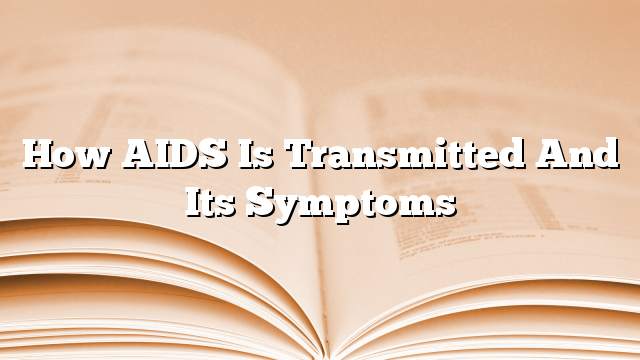AIDS
AIDS or acquired immunodeficiency syndrome (HIV) or as English AIDS Is one of the deadly diseases that affect the immune system directly, and the main cause of HIV infection, and thus lead to weakness and disease, and despite the development of medicine, but there is no cure enough, studies have confirmed that about one million people infected with the disease, and there are many The ways in which he moves and which we will mention in this article.
How AIDS Moves
- The practice of anal or vaginal intercourse with a person carrying the virus, without the use of condoms, or taking drugs to treat the virus.
- Use contaminated needles or needles, especially used by drug addicts.
- Transmission of the virus from the infected mother to the fetus, especially if not treated with antiviral drugs.
- Mother-to-child transmission.
- Transfusion of contaminated blood from an infected person to a healthy person.
- organ transplant.
- Blood is exposed to various contaminants.
- Exercise oral sex.
Symptoms of AIDS
- AIDS symptoms in the first few months are similar to influenza:
- High temperature.
- Severe pain in the throat.
- Pain in the body especially the muscles.
- Sweating especially at night.
- Headache and dizziness.
- Chronic diarrhea.
- Swelling of the lymph gland.
- Ulcers and lesions in the mouth and genital areas.
- Redness of skin but not itching.
- Years later, advanced symptoms appear as follows:
- High body temperature for more than two weeks.
- Itching and redness of the skin.
- headache.
- Sensation of pains throughout the body especially muscles and joints.
- Inflammation of the lymph nodes especially in the neck.
- Sweating especially at night time.
- Chronic diarrhea.
- The appearance of wounds and ulcers in the mouth and reproductive organs.
- Sudden weight loss.
- Nausea and vomiting.
- Difficulty breathing.
- Cough.
- Fatigue and tiredness.
- Vase spots appear on the skin.
- Inflammation of the vagina, throat and mouth.
- Severe bleeding without cause.
The conditions in which AIDS should be examined
- In the case of an abnormal sexual relationship without the use of condoms.
- Genetic factors.
- In the case of contaminated and unclean needles.
- In case of AIDS partner.
Living with AIDS
- Eat healthy foods that contain nutrients such as fruits and vegetables.
- Stay away from dairy products, unpasteurized cheese, uncooked fish, and raw eggs.
- Take the necessary vaccinations to prevent pneumonia and flu continuously.
AIDS complications
- The risk of meningitis.
- The incidence of toxoplasmosis.
- Inflammation and swelling of the lymph nodes.
- Pulmonary embolism.
AIDS prevention
- Stay away from sexual intercourse.
- Conduct seminars and courses on the need to stay away from sexual relations outside marriage.
- Stay away from using contaminated needles.
- Do not use other people’s possessions.
